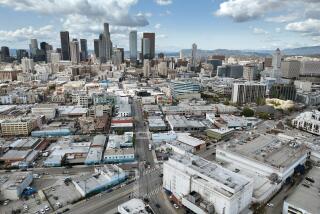Beijing’s Office Space Boom May Turn Out to Be a Bust : China: It is estimated that by the end of 1990 there will be nearly double the amount of office space currently required by the 1,100 foreign companies with offices in the capital.
- Share via
BEIJING — Political instability and a staggering economy are threatening to bust Beijing’s booming market for foreign office space.
Dozens of high-rise office buildings are opening in the capital this year and next, at a time when many overseas companies are reducing operations in China or putting off new investment.
“It’s going to be survival of the fittest,” said James R. Pitchon of Richard Ellis, property consultant for the World Trade Center, Beijing’s biggest building project. “We have a baby market here, and things have been made worse by the current economic situation.”
Pitchon estimated that by the end of 1990 there will be nearly double the amount of office space currently required by the 1,100 foreign companies with offices in Beijing.
It will be a drastic turnaround from even a year ago, when more than half of all foreigners were working out of Chinese hotel rooms with peeling paint, antiquated telephones and stalled elevators.
Foreign companies began moving representatives into Beijing around 1980 with the advent of Deng Xiaoping’s economic reforms and open door policy. But it was not until 1985, with the opening of the 29-story China International Trust and Investment Corp. (CITIC) building, that a select few companies had their first access to modern office space.
In 1986, the Holiday Inn Lido complex of hotel, apartments and offices opened for businessmen. The next year, the 23-story Noble Tower, a project marked by bitter disputes between its Chinese and Canadian partners, began taking in tenants. But that provided only about 57,000 square yards of office space. By next year, the figure will be five times as great.
Heading the newcomers is the World Trade Center, a joint venture with Hong Kong-based Kerry Industrial Co. It features a 38-story tower with 61,000 square yards of office space, two 30-story luxury apartment buildings and two hotels with more than 1,000 rooms.
Among the competition is the Jing Guang Center, a 51-story office-apartment-hotel complex built with Hong Kong and Japanese participation; the 20-story Fortune Building financed by Japan’s Nomura Securities Group; the Hua Wei Center, a Norwegian-Chinese apartment-business project with 23,000 square yards of office space; and Capital Mansion, a CITIC undertaking with a 52-story office-apartment building.
Their openings, however, are clouded by the June military crackdown on the pro-democracy movement and an austerity policy that has stalled the economy and left in doubt the direction of China’s market-oriented reforms. Few firms have left China, but many have trimmed expatriate staff or canceled plans for further investment. Many foreign businesses likely will wait one or two years before deciding the extent of their commitment to China, some real estate experts say, and investing in costly new office quarters will not be a top priority.
Most of the projects are months behind schedule because of typical construction delays in China compounded by work stoppages during the spring’s political turmoil. The World Trade, originally slated to cost $380 million, now will require $450 million due to overruns.
Many projects, such as the two-tower Asia-Pacific Building financed partly by Singaporean and Japanese funds, have asked for rescheduling of loans and extensions of joint venture contracts because of expected slow returns on investment. The Chinese partner in the World Trade Center, the Ministry of Foreign Economic Relations and Trade, has already agreed to extend the life of the joint venture from 20 to 30 years.
At least one major project, a planned 17-story hotel and office building involving the Japanese builder Takenaka Komuten, Mitsubishi Bank and Japan Air Lines, halted construction after June.
“We haven’t abandoned the project,” Takenaka spokesman Fujio Takeuchi said in Tokyo. But he said the project team is waiting for the domestic situation in China to return to normal.
Another project, CITIC’s Capital Mansion, has been hit by construction delays and financing problems, and, some foreign real estate experts say it is a “white elephant.”
Capital Mansion Deputy General Manager Yang Long said the building will not open until the end of 1990. He expressed confidence that the project would succeed, but he said it isn’t signing contracts yet, and “we face serious competition.”
“It’s a race against time,” said George P. Maier, chief operations officer of the Jing Guang Center. Those already taking in tenants have a big advantage, he said.
The Jing Guang began filling its offices and apartments in December, and the World Trade Center will have 115 tenants, about 60% occupancy, by the end of January.
The Fortune Building, promoted by its Japanese managers as a high-technology office complex with a satellite transmission network, has about 40 tenants, mostly Japanese, and foresees occupancy of about 65% next year.
The Norwegian Hua Wei Center, which won’t open until next summer, has leased only 20% of its office space and like many others is offering “flexible terms” to attract customers. The center is asking $35 per square yard a month, but sales manager Dorothy Leung said “this price is negotiable, and we will offer discounts.”
The World Trade Center has also cut its rates from near $40 to about $35 a square yard.
More to Read
Inside the business of entertainment
The Wide Shot brings you news, analysis and insights on everything from streaming wars to production — and what it all means for the future.
You may occasionally receive promotional content from the Los Angeles Times.








